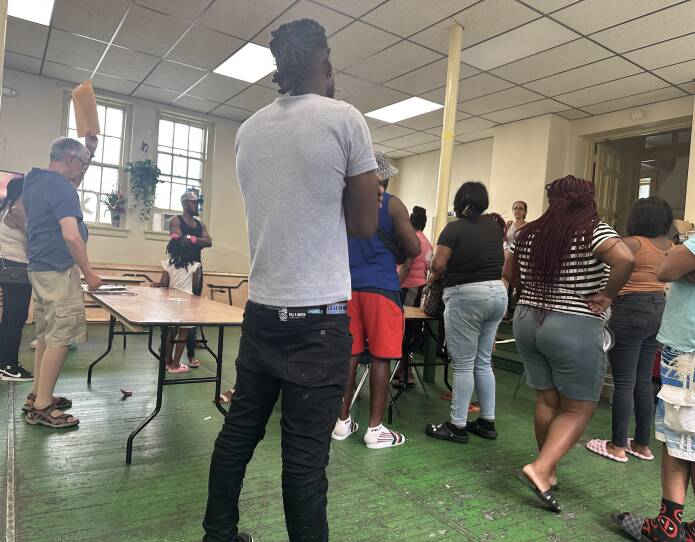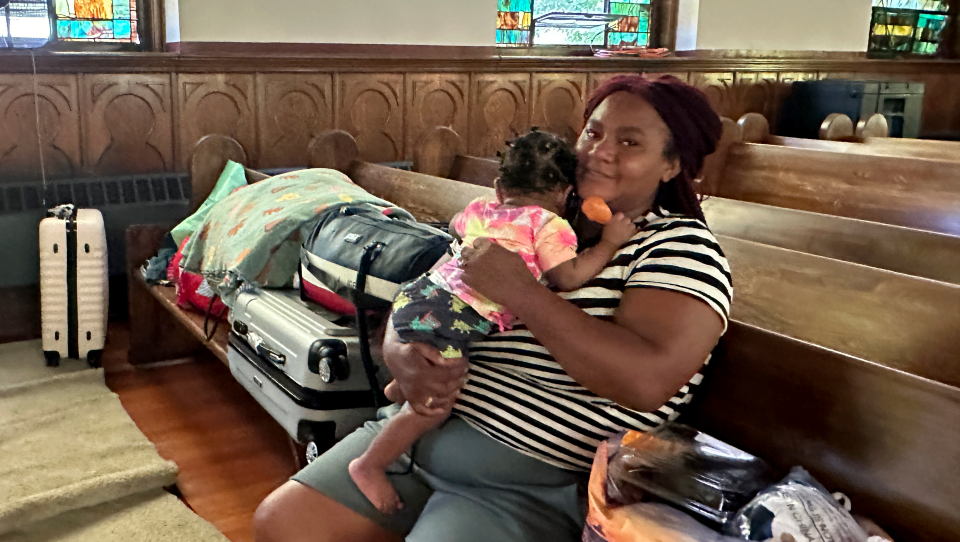Si desea leer este reportaje en español visite El Planeta .
There’s a hum of activity at the church as children chase each other and women roll up bedding to place behind pews.
It’s Luz Berquis Vardez’s second day at Our Saviour’s Lutheran Church in East Boston. She, her daughters and granddaughter are among the about 30 people staying here as a last resort after the state’s emergency assistance shelters maxed out, and overflow shelters limited how long people could stay.
Now, if a family goes to an overflow shelter — limited to a five-day stay, with the potential to extend to up to a month — they have to wait at least six months before becoming eligible for longer-term emergency assistance shelter.
Immigrant arrivals like Vardez face a life-alerting decision — a Sophie’s choice of sorts — between immediate needs and longer-term plans.
“I was told that I could stay in a shelter for five days, but I didn’t accept the five days because if I had stayed for only those days, no one would help me after,” she said in Spanish. “After those five days where would I live? No one knows.”
Instead, Vardez put her name on the waitlist for emergency assistance shelter — and until that comes to fruition, figure out other places to stay.
“I thought it was better to apply and wait, because either way I’d be back on the street,” she said, adding that the two nights outside in Boston terrified her, and she didn’t sleep watching over the girls.
“I just want to find a job, put my daughters in school, make a living. I have my work papers,” she said in Spanish.
Vardez, originally from the Dominican Republic, migrated to Immokalee, Florida, last year. After a devastating car accident killed her baby and husband, she didn’t have enough funds to stay in the $1,300 monthly garage they lived in.
“I heard here they can help you and you can find jobs, so I came,” she said. The family arrived in early August, sleeping first at the airport, then at a bus shelter, outside a Red Line train station, and then a nonprofit paid for two nights in a hotel. After that, came the church.

Ismary Tejada of Venezuela arrived last weekend. She hasn’t applied to be on the state waitlist for emergency shelter, believing that perhaps the church will help her find a stable place to live.
“We went to a center to ask for help — they offered five days to stay, or we could choose the option where you wait for six months,” she said.
For now, the church is a safe place. “Three nights, we sleep on the floor, but it’s not an issue,” she said.
Tejada recently had an interview for a cleaning job at a hotel, but she is nervous about how lack of a permanent residence could affect her ability to work.

Advocates are decrying the changes in state shelter. Judy Wolberg is a volunteer who helped arrange for some of the families to move.
“It’s not real,” she said of the state’s policies. “It’s something on a piece of paper — a policy — not about people’s lives.”
On Monday, everything happened quickly for Our Saviour’s Lutheran Church, which has a long history of sheltering refugees and asylum seekers. Pastor Don Nanstad received an email from the founder of the soup kitchen that uses the church twice a week.
“She had spotted something about this group in Quincy . Within about an hour and a half, we had conversations on the phone — and decided, 'OK, let’s go for it,”’ Nanstad said.
At the church, each day is what matters, not necessarily the future, because the present is chaotic.

At around 3 p.m., the new arrivals gather by the kitchen, where East Boston Community Soup Kitchen’s executive director Sandra Nijjar is organizing a trip to Market Basket. She needs two volunteers from the group to do the shopping, after the group makes a grocery list.
“Eggs, rice, oil — the kinds of things you would need to cook for two days. Buy some meat, for today, and tomorrow,” said Nijjar.
People began to talk amongst themselves to see who would cook in the church kitchen the next couple days, using a stipend. Nearby, Pastor Don Nanstad offers shower vouchers at a nearby space that is offering them between 6 and 8 p.m. Adults are eager to go.
Nanstad said 30 people in a church with 2,000 square feet can be “awkward,” but they will make it work.
“Some people are going to start to be in a position where they could move out,” he said. “But I don’t see how we can do anything but to stay in it until they’re all done. Unless they find another place.”





